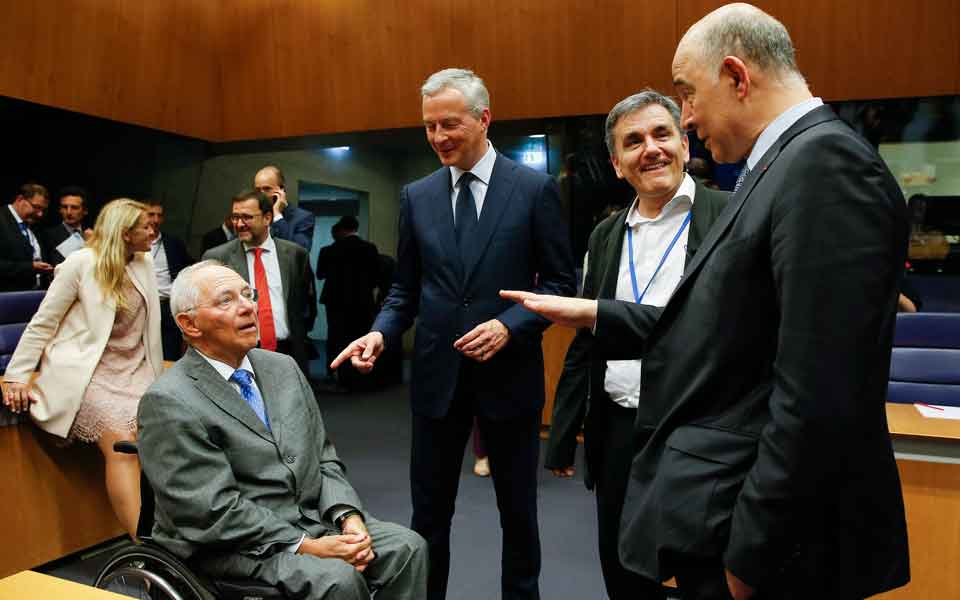A step has been taken; now for the rest

Prime Minister Alexis Tsipras referred to the agreement at Thursday’s Eurogroup in Luxembourg as a “crucial step” towards getting Greece out of its crisis. It may turn out to be the most accurate assessment he has made in a premiership littered with false dawns and costly miscalculations.
Tsipras will probably try to oversell the gains his government made at the negotiating table. He had wanted to take home much more from the meeting of the eurozone finance ministers than he actually managed. However, what he obtained has some vital elements that are needed for Greece to exit its third bailout program and not need a fourth one straight afterwards.
Much will depend on whether the Greek government chooses to use this opportunity to look ahead and whether local entrepreneurs as well as foreign investors will be convinced that Greece is really poised to leave the so-called “memorandum years” behind.
The Eurogroup deal did not provide Athens with immediate inclusion in the European Central Bank’s quantitative easing (QE) scheme, which Tsipras and his advisers felt would be a stepping stone towards returning to the markets. In this sense, Athens failed in its pursuit and the agreement fell short of expectations. The SYRIZA-led administration’s negotiating strategy again proved to be deeply flawed. However, the last few months of to-ing and fro-ing between Greece and its lenders has left the government with some gains it can build on in the coming months.
In the short-term, the bailout tranche of 8.5 billion euros, which is some 1 billion more than what was initially expected, means that more money can be diverted to paying off state suppliers. Government arrears total almost 5 billion euros, and 1.6 billion from the two sub-tranches that Greece is due to receive will be used to reduce arrears, injecting some essential liquidity into the local market.
There was also a pledge to rustle up almost an extra 1 billion euros in European Union funds and support for the creation of a national development bank. Although both would be welcome developments, it appears that their inclusion in last Thursday’s Eurogroup statement was for cosmetic purposes.
The most important elements of the agreement, though, related to the medium- and long-term.
The primary surplus targets for the 2018-2022 period were confirmed at 3.5 percent of the gross domestic product. After that, and until 2060, Greece will have to produce primary surpluses of around 2 percent of GDP. Many will argue, with some justification, that this is far too high given the current state of the Greek economy, but the figures are lower than the ones proposed by some creditors recently.
On debt relief, the Eurogroup confirmed a previous offer to extend the grace period and maturities of loans Greece has received via the European Financial Stability Facility (EFSF) by up to 15 years, adding a touch of clarity to the measures that could be implemented once the current program is completed next August.
The Eurogroup also agreed to incorporate in its deliberations about the final restructuring package a proposal made by Emmanuel Macron’s government. France revived an older suggestion that Greece’s growth rates should determine the level of debt relief it receives. In other words, if growth is higher than had been forecast, less relief will be given and vice-versa. Athens gave the proposal its full support and the other eurozone member states also appeared convinced it could work.
The details of how this mechanism would function will have to be decided in the weeks and months ahead, but it provides some hope that a constructive discussion can take place and that the need to make growth a more important part of the debate than debt can be understood by everyone concerned.
The onus is now on the eurozone lenders to come through on their commitment. It is clear that no work on debt relief, beyond the technical level, is going to take place until the German elections are out of the way in September. Thursday’s agreement has conveniently, as far as Berlin is concerned, parked the issue for a few months.
In September, though, Greece will be less than a year away from the end of the current program and some clarity about how it will exit the bailout will have to be generated. If its creditors begin moulding the restructuring package, at some stage it could be deemed sufficient for the ECB to start buying Greek bonds. But even if this does not happen, it will send a clear message to the markets that Greece will not need a new program.
This is another vital step in the process as Athens will be able to build its market return on this signal. It will have to start issuing bonds before August 2018 to re-establish ties with investors – albeit those looking for higher yields – but also to start bringing down its borrowing costs.
If markets suspect that Greece’s return is not sustainable, this will be catastrophic for Athens and its lenders, as a fourth bailout will begin to loom on the horizon. It is safe to say that for all their differences, nobody in Greece or the other eurozone countries has the appetite to negotiate a new adjustment program and put together more loan packages.
This is why Tsipras identified in his televised speech on Friday the last paragraph of the Eurogroup statement as the most important part of the two-page text published after the finance ministers’ meeting.
“In view of the ending of the current program in August 2018, the Eurogroup commits to provide support for Greece’s return to the market: the Eurogroup agrees that future disbursements should cater not only for the need to clear arrears but also to further build up cash buffers to support investors’ confidence and facilitate market access,” it reads.
Tsipras described this as a pledge to put a permanent end to the Greek bailouts in August 2018. Perhaps he is guilty of getting ahead of himself, but the intention is clearly to ensure that Greece is in a position next summer to fend for itself after what will then be over eight years under a program.
The Eurogroup agreement reached last Thursday was a crucial step in that direction, but many more steps will have to follow between now and then.





